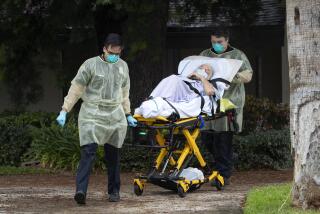Clinton Seeks to Bolster Oversight of Nursing Homes
- Share via
WASHINGTON — The White House proposed spending an extra $16 million to improve oversight of nursing homes, but a GOP congressional leader said that won’t fix the flawed system for monitoring care.
President Clinton will ask Congress for the extra money in his 2001 budget plan to pay to train inspectors, conduct surprise inspections and crack down on the 100 worst facilities.
Vice President Al Gore, campaigning for president in New Hampshire, announced the proposal Friday at a meeting with the National Council of Senior Citizens.
“We want to upgrade the enforcement of standards at nursing homes so we can make sure those standards are good,” Gore said.
Sen. Charles E. Grassley (R-Iowa), chairman of a Senate Special Committee on Aging, said more money won’t guarantee better quality at nursing homes because the U.S. government does a poor job of making sure that state inspectors enforce federal nursing home laws. “Under this system we could quadruple enforcement money with no guarantees of success,” he said.
Grassley said the Department of Health and Human Services, which administers the enforcement funds, should assure taxpayers they are getting their money’s worth before increases are approved.
A nursing home group said that what is needed is more money for staffing, not monitoring.
Medicare and Medicaid, which finance bills of most nursing home residents, pay too little for facilities to recruit and keep highly qualified staff, the group said.
“Quality of life and quality of care is not being measured,” said Linda Keegan, vice president of the American Health Care Assn. “If the administration is going to look at investing more in long-term care, it should look at staffing.”
The administration proposal would bring funds for nursing care oversight to $70 million, an increase of close to 30% from last year.
Most of the money goes to state agencies responsible for inspecting 16,700 nursing homes providing care for about 1.6 million older Americans.
Specifically, money would be earmarked for:
* Training inspectors to file computerized reports on nursing home compliance that will make it easier to identify problem homes, track whether they are improving and provide information for surveyors visiting the facilities.
* Inspecting nursing homes during evenings and weekends to ensure that facilities, where staff know that inspections normally occur during the day, aren’t hiding substandard practices.
* More inspections of at least 100 homes with the worst compliance records.
More to Read
Get the L.A. Times Politics newsletter
Deeply reported insights into legislation, politics and policy from Sacramento, Washington and beyond. In your inbox twice per week.
You may occasionally receive promotional content from the Los Angeles Times.










